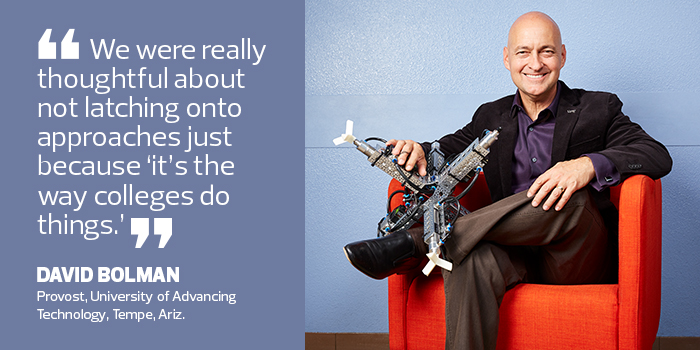Q&A: Academic and Startup Cultures Meet at the University of Advancing Technology
The University of Advancing Technology in Tempe, Ariz., has been a pioneer in IT education since 1983. Although UAT will mark its 35th anniversary in 2018, this institution makes a habit of looking forward, not back. With a mission to educate students in areas such as network engineering, virtual reality, artificial intelligence and data security, UAT’s approach is a unique blend of academic inquiry and entrepreneurial spirit.
Provost David Bolman spoke with EdTech Managing Editor Amy Burroughs about how the university nurtures a culture of iteration and innovation — and how IT leaders can do the same in their departments.
SIGN UP: Get more news from the EdTech newsletter in your inbox every two weeks!
EDTECH: How does UAT manage the challenge of specializing in tech, which is always evolving?
Bolman: We grappled with this 35 years ago as we were first starting out, because at the time tech was so fluid. We learned to use what is now termed an agile approach in how we develop our programs. We scan out into the future, keep an eye on what the directions and the potentials are, and do a wide-range motion toward the top areas that seem promising. Then we take a step forward to launch some courses or an area of study.
As we get closer to launching a new program, we put it out there in the wild, test it, get feedback and refine it. We constantly keep things in this sort of creative tension, with enough clarity to take the next step, but enough wiggle room to dial in wherever the technology lands.
EDTECH: Is that easier because UAT didn’t start out as a traditional university?
Bolman: We were really thoughtful about not latching onto approaches just because “it’s the way colleges do things.” We had an opportunity to redefine that and stay future-focused. One value that emerged was to always have the institution exist halfway between an excellent, private-college academic space and an entrepreneurial, startup technology company.

In terms of our operational infrastructure, our mission and how we set our values and goals, we behave like a tech startup. But academically, we spend a tremendous amount of time on the practice of what great education looks like — research, training and development into great constructs and great delivery — so it’s a constant blending of the best part of education with the best part of a tech startup.
EDTECH: How can IT leaders create a similar culture?
Bolman: Being small and nimble is more valuable than having long development cycles that build complexity and are precisely designed and executed. Right now, we have so many tools that can quickly take an idea, turn it into a product and get it in front of consumers. It’s more important for organizations to build their development cycles and the way their employees work into short bursts and sprints. Leverage the fact that you can get something functional in front of users, who will tell you what works and what doesn’t work for them.
EDTECH: How do you imagine higher education in a few decades?
Bolman: What I think teachers and professors will do is look at students the way managers look at people: I’ve got a roomful of people whom I need to grow to this point. Who are they as individuals? What are their learning styles? Their behavioral patterns? Where are they right now? And how can I tinker with them as a coach to move them forward?
Technology is allowing us to be better at learning because we can provide moments where, regardless of time and space, you can have a meaningful, face-to-face interaction with an instructor. And because the information is everywhere, instructors can stop spending time on transporting information and focus instead on how information weaves together. Even in the lowest grades, you don’t need to go to learners and say, “Let me just spit facts at you.” It’s there, they can get to it on their own. What you have to do is weave the narrative that makes them want to get to it.
EDTECH: What emerging technologies are you excited about?
Bolman: What I think will affect most people is the idea that all of us have this data footprint we’re walking around with — patterns, emotions, activities — and we're starting to get pretty good at finding ways to use it. I think what’s going to surprise people in the next five to 10 years is how we’re finally going to see a lot of technology that quietly and subtly allows us to do what we do faster and better.
Personally, I’m most excited about space exploration. When I hear that we’re going to have meaningful exploration of Mars in the next 10 years, that gets me jazzed up.
I tell incoming students, “Guess what? This epochal moment in human development is right around the corner, and someone in this room is going to work on it.”






